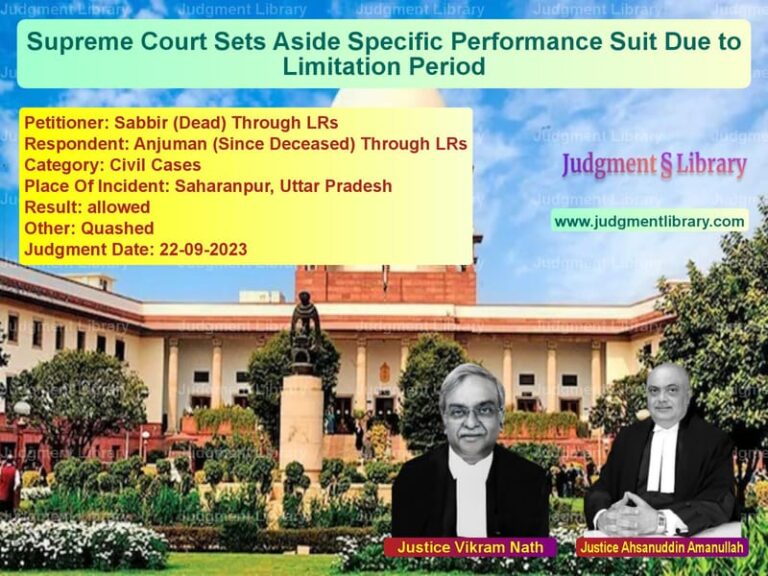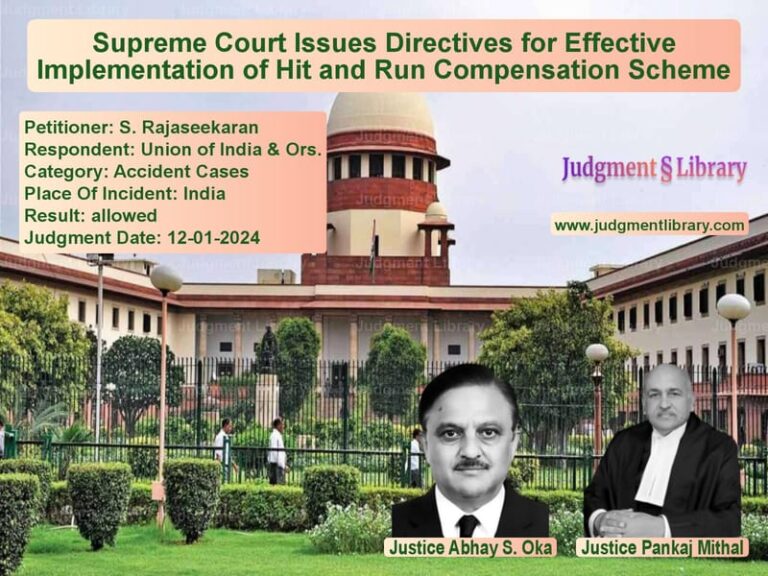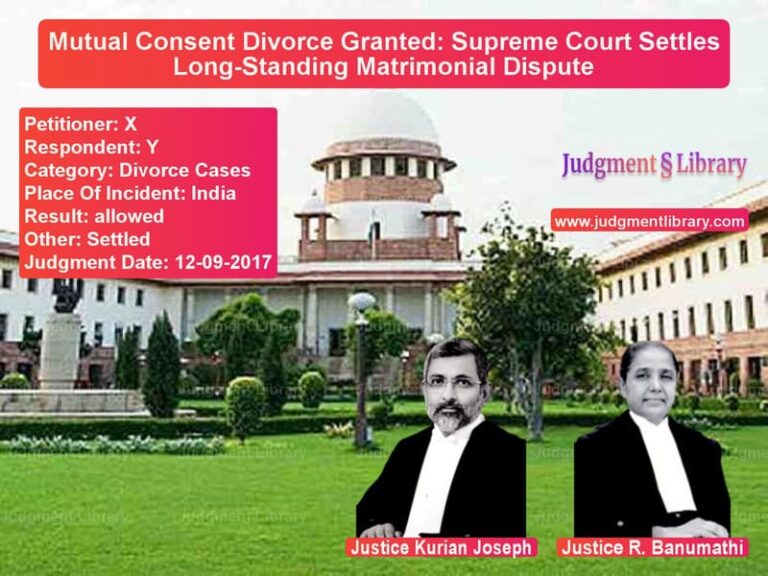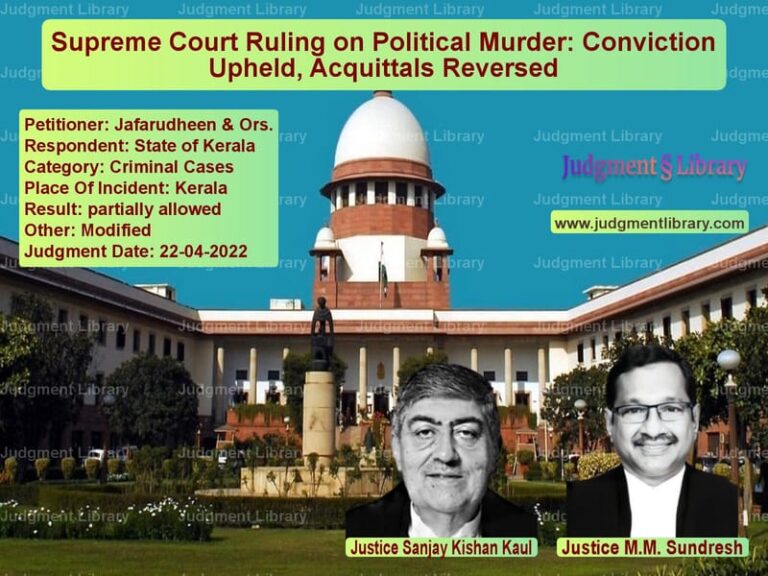Reservation for Disabled Candidates in Government Jobs: Supreme Court Reverses Allahabad High Court’s Decision
The case of Ajay Kumar Pandey & Ors. vs. State of U.P. & Ors. revolved around the issue of reservation for disabled candidates in government jobs in Uttar Pradesh. The dispute concerned the selection process for the post of Safai-Karmis (sanitation workers) and whether candidates with locomotor disabilities were entitled to reservation under the state government’s notification.
Background of the Case
On 16.06.2008, an advertisement was published inviting applications for 1,651 posts of Safai-Karmis in District Mau. The reservation breakup included 346 posts for Scheduled Castes, 34 for Scheduled Tribes, and 445 for Other Backward Classes. There was also a provision for reservation for women, disabled candidates, freedom fighters, and ex-servicemen, although the exact number of posts reserved for each category was not specified.
The appellants, who were persons with locomotor disabilities, applied for the position under the reserved category for disabled candidates. They participated in the selection process, including the cycling test and interview. However, they were not appointed, leading them to file a writ petition before the Allahabad High Court in 2018.
Government Notification and High Court Ruling
The key legal dispute was centered around the Uttar Pradesh government’s notification (G.O.) dated 07.05.1999, which identified specific posts that could be reserved for persons with disabilities under the Persons with Disabilities (Equal Opportunities, Protection of Rights and Full Participation) Act, 1995. The G.O. specified that posts of Sweeper (dry, wet, sewer, cleaner, etc.) could be reserved for candidates with hearing impairments, while posts like Peon, Office Boy, and Process Server were identified for persons with locomotor disabilities.
The High Court, in its judgment, struck down the government notification, ruling that the reservation policy was unconstitutional because it discriminated between different categories of disabled candidates. The court held:
“In view of Section 33 of the Disabilities Act, 1995 read with Section 3 of the U.P. Reservation Act of 1993, all categories of disabled persons are entitled to avail reservation up to 3%, of which 1% each is available to persons suffering from (i) blindness or low vision; (ii) hearing impairment; and (iii) locomotor disability or cerebral palsy.”
The High Court’s order meant that all disabled candidates, regardless of their specific disability, should have been considered for reservation for the post of Safai-Karmis.
Arguments Presented
Petitioners’ Arguments
- The appellants argued that since the High Court struck down the G.O. as unconstitutional, they were entitled to appointment under the reserved category for disabled candidates.
- They contended that the government had unfairly excluded persons with locomotor disabilities from being appointed as Safai-Karmis.
- They pointed out that they had participated in the selection process and met all eligibility criteria.
Respondents’ Arguments
- The State of Uttar Pradesh contended that the High Court misinterpreted the law and wrongly struck down the G.O.
- The state argued that the identification of posts for disabled candidates was in accordance with Section 32 of the Disabilities Act, which allows the government to identify specific jobs for different categories of disabled persons.
- It maintained that the posts of Safai-Karmis were not suitable for persons with locomotor disabilities, and the reservation for hearing-impaired candidates was based on practical job requirements.
Supreme Court’s Analysis and Judgment
The Supreme Court disagreed with the High Court’s ruling and reinstated the government notification. The Court held that the identification of posts for different categories of disabled persons was a legitimate policy decision made by the state government. The Court ruled:
“The identification of the posts which can be filled up by candidates suffering from disabilities is the responsibility of the appropriate Government under Section 32 of the Act, which is the State Government in the present case. Once such exercise has been carried out, the appropriate Government in terms of Section 33 of the Act shall reserve 1% each for the visual disability, hearing impairment and locomotor disability.”
The Court further clarified that the 3% reservation for disabled candidates applies to an establishment as a whole and does not mean that every job within the establishment must be made available to all categories of disabled persons.
Key Observations by the Supreme Court
- The Court reiterated that the government has the authority to decide which jobs are suitable for different types of disabilities.
- It held that “3% reservation is to be provided in an establishment and not in every cadre”, meaning that not all job categories need to be open to all disability groups.
- The Court found that the High Court had misread the provisions of the Disabilities Act and had wrongly struck down the government notification.
Final Judgment
- The Supreme Court upheld the validity of the Uttar Pradesh government’s notification dated 07.05.1999.
- It ruled that candidates with locomotor disabilities were not entitled to be appointed as Safai-Karmis since the post was not identified for them under the G.O.
- The Court set aside the Allahabad High Court’s decision and dismissed the appeal filed by the petitioners.
Implications of the Judgment
This ruling has significant implications for disability reservations in government jobs:
- It reaffirms the government’s authority to classify jobs based on their suitability for different types of disabilities.
- It clarifies that reservation policies must align with practical job requirements rather than a blanket application across all positions.
- It ensures that judicial intervention does not override executive decisions unless there is clear discrimination or violation of constitutional rights.
Conclusion
The Supreme Court’s decision in this case serves as a critical precedent in defining how reservations for disabled candidates should be implemented. It highlights the necessity of identifying suitable roles for different disabilities and upholds the government’s power to make such classifications. The ruling ensures that while reservations for disabled persons remain a fundamental right, they must also align with job functionality and practical work requirements.
Petitioner Name: Ajay Kumar Pandey & Ors..Respondent Name: State of U.P. & Ors..Judgment By: Justice Hemant Gupta, Justice Vikram Nath.Place Of Incident: Uttar Pradesh.Judgment Date: 01-08-2022.
Don’t miss out on the full details! Download the complete judgment in PDF format below and gain valuable insights instantly!
Download Judgment: ajay-kumar-pandey-&-vs-state-of-u.p.-&-ors.-supreme-court-of-india-judgment-dated-01-08-2022.pdf
Directly Download Judgment: Directly download this Judgment
See all petitions in Employment Disputes
See all petitions in Public Sector Employees
See all petitions in Recruitment Policies
See all petitions in Judgment by Hemant Gupta
See all petitions in Judgment by Vikram Nath
See all petitions in dismissed
See all petitions in supreme court of India judgments August 2022
See all petitions in 2022 judgments
See all posts in Service Matters Category
See all allowed petitions in Service Matters Category
See all Dismissed petitions in Service Matters Category
See all partially allowed petitions in Service Matters Category







